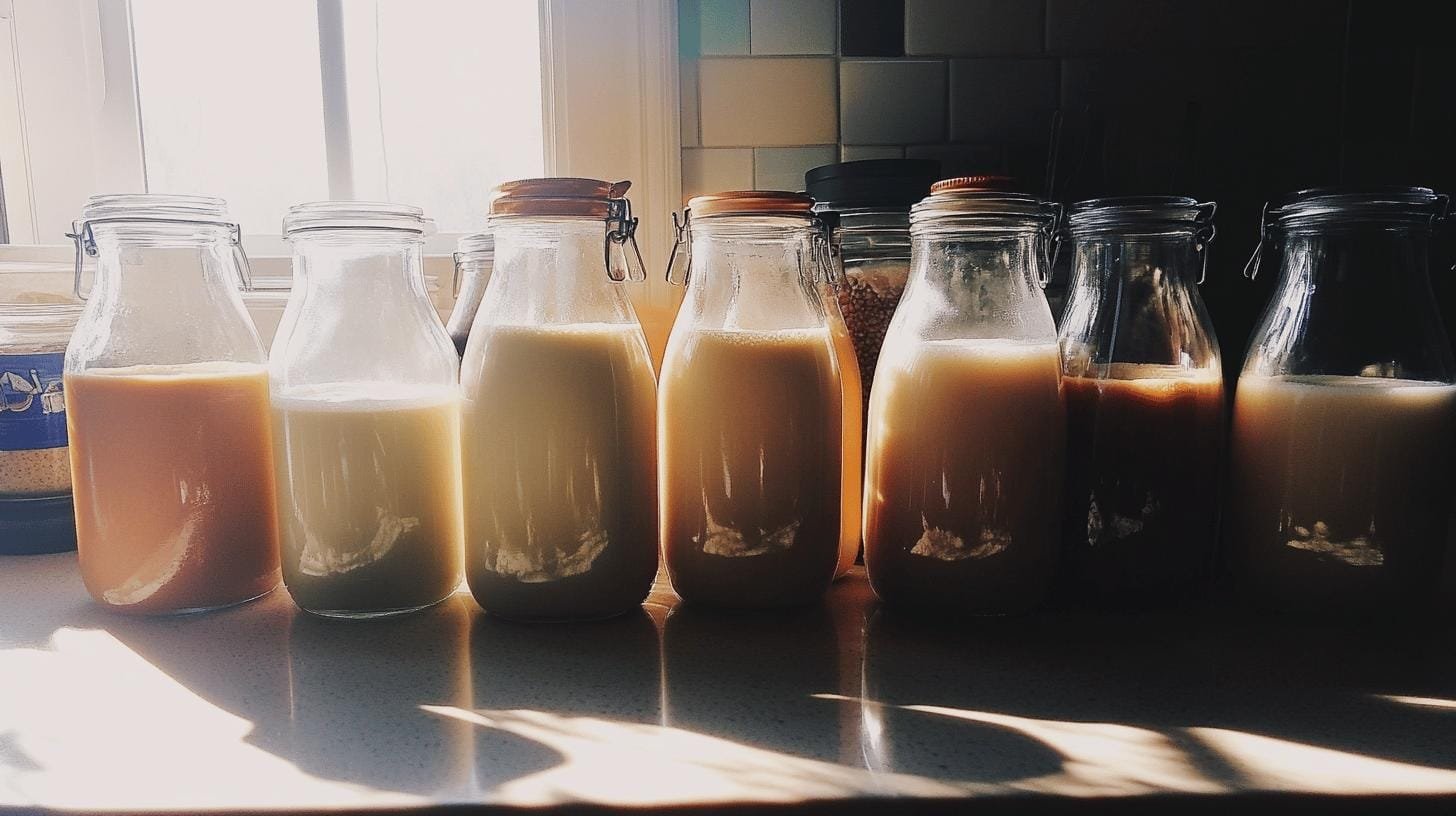
Artisanal Rituals for a Memorable Customer Experience
How can brands create a more balanced and memorable customer experience by blending artisanal product quality with thoughtful everyday rituals that keep people coming back?

Can your coffee cup be both a morning delight and a beacon of health? With the global consumption of coffee surpassing 166 million 60-kilogram bags annually, millions are swapping traditional milk for alternative options. These milk substitutes are captivating coffee lovers for their ability to enhance taste while catering to dietary, health, and environmental preferences. Dive into this article to understand these healthiest milk alternative for coffee and how they are transforming coffee experiences worldwide.
Coffee is loved worldwide, with over 166 million 60-kilogram bags consumed annually. Many coffee lovers use milk to mellow its bold flavor. As dietary, health, and ethical concerns gain importance, non-dairy milk alternatives are becoming more popular among coffee drinkers.
Dietary restrictions like lactose intolerance or veganism often drive people to healthier coffee options. These milk types usually have lower cholesterol and saturated fat compared to dairy milk. Environmental concerns about dairy farming, such as greenhouse gas emissions and water use, also encourage the shift towards sustainable options.
Popular milk alternatives include soy, almond, oat, and coconut. Soy milk is high in protein, almond milk has a nutty taste, oat milk is creamy, and coconut milk adds sweetness.
These healthiest milk alternative for coffee align with the rising demand for personalized and ethical consumption. As coffee culture evolves, people seek brews that not only taste good but also reflect their values. Non-dairy milks, therefore, represent a growing segment, offering versatility for various diets and lifestyles.

| Milk Type | Protein Content | Fat Content | Carbs |
| Soy Milk | High | Moderate | Low |
| Almond Milk | Low | Low | Low |
| Coconut Milk | Low | High | Low |
| Oat Milk | Moderate | Low | High |
| Cashew Milk | Low | Moderate | Low |
Protein content in these healthiest milk alternative for coffee helps create foam and enhances the body of drinks. Soy milk’s high protein makes it a good choice for frothy lattes, despite curdling risks. Almond and oat milks, though low in protein, can still boost flavor. Each milk’s nutritional profile impacts texture and the overall sensory experience of coffee.
Taste-
Almond milk has a sweet, nutty taste that complements coffee but may dilute richness due to its watery texture. Coconut milk adds subtle sweetness with a creamy feel, though it may separate. Oat milk’s strong oat flavor is loved by some but disliked by others, offering a rustic touch. Soy milk has a mild, earthy taste, allowing coffee’s flavors to stand out. Its creamy consistency makes it ideal for a smooth experience.
Texture-
Milk texture significantly affects coffee. Almond milk’s thinness lacks creaminess. Coconut milk, creamy yet prone to separation, impacts texture and appearance. Oat milk offers creaminess but can curdle, affecting smoothness. Soy milk delivers a consistent, smooth finish, making it a reliable choice. Users often favor soy and oat milks for their blendability and desirable texture, while almond and coconut milks may need expectation adjustments due to their unique textures.

Plant-based milks are generally better for the environment, creating less greenhouse gas, needing less land, and using less water than dairy. This makes them sustainable options. However, options like almond milk have sustainability issues due to high water use, which is concerning in drought-prone areas.
Ethical considerations while sourcing plant-based milks include fair labour practices and preventing deforestation. It is important to choose brands that ensure fair wages and safe conditions for workers while committing to sustainable farming to protect ecosystems and biodiversity.
Consumers can opt for brands that focus on ethical and sustainable practices. Choosing locally produced plant-based milks can reduce carbon emissions from transportation. By considering environmental and ethical aspects, coffee drinkers can select the healthiest milk alternative for coffee that match their values.
Choosing the healthiest milk alternative for coffee depends on personal taste and dietary needs.
For lactose intolerance, plant-based milks like almond and oat are easier to digest and offer a creamy texture. They are widely available, making them popular options.
Taste and texture are key. Almond milk’s nutty flavor and lightness may appeal to those seeking subtlety. Oat milk, with its creaminess, is ideal for lattes, offering a rich mouthfeel.
In terms of nutritional needs, Soy milk is protein-rich, comparable to dairy, while oat milk, higher in carbs, provides fiber, useful for adding nutrients to coffee.
Some recommended brands include; Oatly and Califia Farms who offer barista-approved oat and almond milks with consistent quality.
Understanding the healthiest milk alternative for coffee involves assessing various factors.
Each option offers distinct nutritional benefits, taste, and texture profiles. Almond milk, soy milk, and oat milk stand out for their unique qualities, though each comes with specific compatibility considerations.
Furthermore, the environmental impact of milk alternatives highlights the importance of making sustainable choices. The key to selecting an optimal milk substitute lies in balancing personal preferences with health and environmental priorities.
By doing so, coffee lovers can enhance their beverage experience while contributing to a more sustainable future.
The healthiest milk alternative for coffee depends on individual dietary needs. Almond milk is low in calories, while oat milk provides fiber. Soy milk is protein-rich, making them popular choices for health-conscious coffee drinkers.
Almond, soy, and oat milks are nutritious plant-based choices. Soy milk has high protein content, almond milk has low calories, and oat milk offers fiber, balancing health benefits with coffee compatibility.
Almond milk is a favorable choice for weight loss, offering fewer calories without heavily altering coffee’s taste. Its low-calorie profile makes it suitable for those managing calorie intake.
Barista blends of plant-based milks, especially oat and soy, are less likely to curdle. They are formulated to withstand coffee’s acidity, maintaining a smooth blend and texture.
Oat milk supports gut health due to its fiber content. This property promotes digestive well-being, making it a beneficial alternative for enhancing coffee with gut-friendly attributes.

How can brands create a more balanced and memorable customer experience by blending artisanal product quality with thoughtful everyday rituals that keep people coming back?

Independent coffee shops have always been about more than caffeine—they’re hubs of creativity, connection, and care. As café culture continues to evolve, new trends are

Introduction Independent cafes win when they feel like the neighborhood’s living room and operate with the discipline of a great kitchen. Below is a quick

Discover how top specialty coffee brands create lasting loyalty through storytelling, sourcing, and community connection. Real tips from 6 industry experts.

Discover the ultimate showdown between two beloved coffee brewing methods: the French press and Chemex. Explore how each technique caters to distinct palates, with the French press delivering bold flavors and the Chemex presenting a bright, clean taste.

Unlock the secrets to brewing the perfect cup of coffee with our comprehensive guide on using a coffee scale. Discover how precise measurements enhance flavor and consistency while eliminating bitterness.

Discover how water temperature plays a vital role in brewing the perfect cup of coffee. This article delves into the ideal temperature range of 195°F to 205°F for optimal flavor extraction, enhancing the enjoyment of high-quality beans.

Discover the world of curated specialty coffee bundles, perfect for enthusiasts seeking quality and craftsmanship. This article explores the benefits of ethically sourced, small-batch beans from brands like Equipoise Coffee, offering diverse flavor profiles that elevate your brewing experience.

Discover the art of manual brewing to elevate your coffee experience! This article explores various techniques like pour-over, French press, and AeroPress, revealing how they enhance flavor and your connection to every cup.